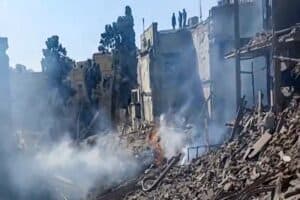Comrades, you cannot braai and eat the golden goose and then wonder, the following day, what has happened to the golden eggs.

The city formerly known as Port Elizabeth (Gqeberha) is a microcosm of the broader South Africa of 2022… flashes of amazing potential, sullied by decline and incompetence and looting.
Driving towards the city along the N2 from the East London side, one sees a vision of a South Africa that could have been (and, hopefully might still be).
The port at Coega is surrounded by vast factories and warehouse springing up on the rolling beach dune landscape.
ALSO READ: Hundreds of Gqeberha residents stuck on land polluted by methane gas
As you move down the dual-carriageway highway, you see more than a dozen ships anchored in the bay, waiting to load or unload.
This could be a sign of the world returning to normal…or a sign that our ports can’t cope. I wasn’t there long enough to find out.
In the CBD, though, the signs of decay and neglect are everywhere – from the unwashed and unpainted art deco buildings, to the mounds of litter piled in off-street corners.
In the Summerstrand beachfront area, Gqeberha is still very much an attractive holiday seaside destination, the boardwalk tidy and clean, the restaurants and car parks full, even on a Monday evening.
Yet, the city is approaching day zero, as a combination of a lack of maintenance of water infrastructure (which sees 40% of its water being wasted) and incompetent ANC apparatchiks who have led it into this crisis.
At Ford’s engine plant at Struandale, I see another vision of the South Africa we could have: A technological leader on the African continent with jobs being created everywhere.
One of those jobs at the plant has gone to Nocawa Mthembu, who is an electrician on one of the production lines, and who owes much of her training, and experience, to the international car maker.
READ MORE: Ford SA injects R600m into its Gqeberha engine plant
It enables her to earn a living and look after her three kids – and show them that women can do anything men can.
She’s grateful, but also proud at her own hard work. Nobody gave her anything for nothing.
And that’s an attitude we need to see more of in this country.
Also at Struandale, I meet Zaid Isaacs, who has been with Ford since 1980 and, like many others, has grown with the company and changed along with the rapid changes in tech.
He is deeply involved in the complex logistics (both incoming and outgoing) which ensure that a plant like this keeps running at optimum efficiency.
Like the rest of the team, he cannot take his eye off the ball for a second. If he did, something would go wrong and the rest of the group would notice.
It’s a responsibility he and others take very seriously. And they have to – if they were not competitive, Ford would go elsewhere in its group.
That is something many South Africans – as they moan constantly that life is not their fault – fail to realise.
ALSO READ: Nelson Mandela Bay opposition parties agree to work together to remove ANC from power
Foreign investment like Ford’s – the company put R600 million into Struandale and almost R16 billion into the Silverton plant in Pretoria – depends on a favourable climate, in terms of government relations, general economic factors and labour stability.
That’s why it’s worrying to hear that the National Union of Metalworkers of SA (which represents many workers in the motor industry) is muttering about wanting a double digit increase on pain of a strike.
Comrades, you cannot braai and eat the golden goose and then wonder, the following day, what has happened to the golden eggs.
Support Local Journalism
Add The Citizen as a Preferred Source on Google and follow us on Google News to see more of our trusted reporting in Google News and Top Stories.






